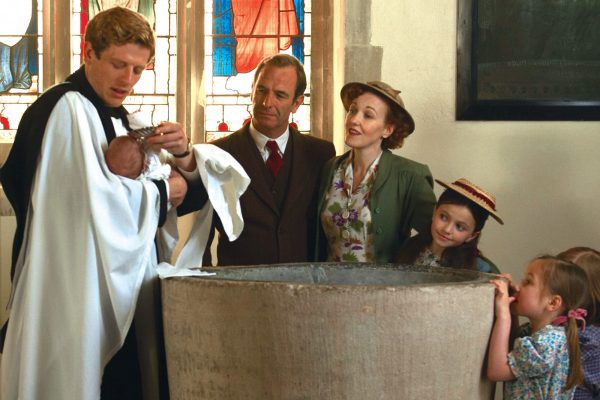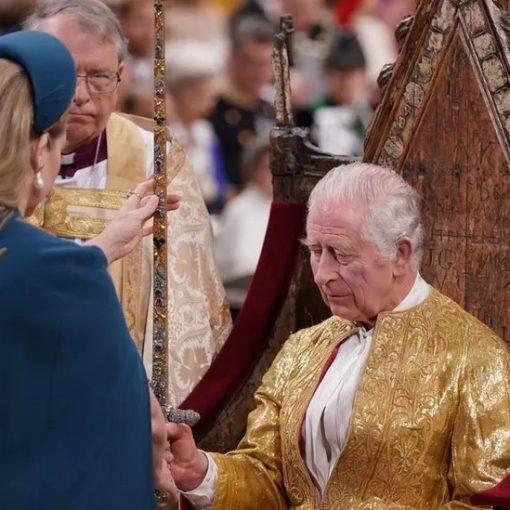Last week was the third season finale of the series Grantchester. Having watched an enjoyed all three seasons to date, I wanted to share my critique of the show. A few preliminary comments are relevant. First, I deeply enjoy this genre, the British period mystery. Now, I have been a fan of Dorothy L. Sayers and her mysteries almost since I could read and GK Chesterton’s Father Brown (the original stories, not the recent TV show) follows close behind. Granted, they were contemporary when they were written, but they set the standard for thoughtful, clever, non-detectives whose dialogue included substantive discussion.
I should also note that I have never read the original short stories. The comments that follow are relating to the ITV show broadcast on PBS here in the States. Finally, it does irritate me immensely that Sidney, our priestly hero, only ever wears Evensong attire, regardless of event. It can be Christmas morning, a wedding, or a funeral (and we have seen them all) yet he will always be wearing a cassock, surplice, and tippet. Now, to the topic at hand The Sex of Grantchester,

Set in 1953 post-war Cambridgeshire town of Grantchester (a very real town, Gary Rendsburg was just there)., acording to Wiki, “The Grantchester Mysteries is a series of crime fiction books of short stories by the British author James Runcie [son of former Archbishop of Canterbury Robert Runcie], set during the 1950s in Grantchester, a village near Cambridge in England. The books feature the clergyman-detective Canon Sidney Chambers.” Sidney is a vicar who helps Geordie, the local detective inspector, with cases and generally shows his wit and humanity. Sounds like a tried and true British detective show and certainly brings to mind GK Chesterton’s Father Brown (I absolutely love the original stories, the recent TV show is, however, sadly lacking for much of the same reasons I am about to offer regarding Grantchester). But while it is the clerical status of the main character that evokes thoughts of the diminutive catholic priest, it is the actual subject matter of relationships and love that make me compare Sidney to Harriet Vane, the heroine of Dorothy L. Sayers’ mysteries.
As the series has developed, again at least the TV version, the dominating theme is a blithe critique of the sexual mores of the 1950s. Crime is incidental to the major plot lines. That is not necessarily a bad thing as anyone who has watched Midsommer Murders knows; there are only so many murders one can have in a small hamlet before the place is, or ought to be, depopulated. And the very best murder mysteries are, IMHO, not about murder at all, but the exploration of humanity. The primary plot lines of Grantchester follow the sexual relationships of our central characters.
The series is shot through with sexual taboos of mid-century Britain (and the US) being set up and knocked down like skittles. (The game, not the candy.) The show began with Sidney’s old friend Amanda having a baby but leaving her abusive husband. She and Sidney are deeply in love, clearly, but she will soon be a divorced woman and that is unacceptable for a vicar in those days. In the second season, Geordie began an affair with a much younger woman from the office which lasted through season three. Leonard, Sidney’s curate, is gay and wrestles with his orientation and attraction to men throughout the series. Leonard’s plot has been almost an aside and yet is perhaps the most sensitively done of all the love lines. As he wrestled with his feelings, this past season he became engaged to a woman only to have her break it off, saying that he was an “abomination.” While Leonard struggles with his identity and proclivities, the other primary characters are all very supportive of him. Geordie, in contrast, is castigated by Sidney for his infidelity while Geordie (and just about everyone else from his housekeeper to the Archdeacon) challenge Sidney on his hypocrisy.
The difficulty is that while our characters struggle with their own relationships (even the housekeeper, Mrs. M, has her own set of relationship plot lines), they do so in a very modern manner. Presumably the writers are trying to set the dowdy cultural norms of the 50s in relief against our progressive twenty first century. While it is believable (and factual!) that many in the 50s, especially in the wake of the war and laying the groundwork for the 60s, were accepting of broader views of sexual mores, it strains credulity to believe that every character we should care about should just happen to be the ones most likely to hold our modern views. Consider this: Geordie has been largely (if quietly) supportive of Leonard, yet not only was homosexuality against the law in those days, we are given the strong impression that Geordie is a solid working class man. Enlightenment for him is an electric light on his desk.
Now I want to be very clear (and contemplating this is what kept me from posting it for the last week), I see nothing wrong with a show exploring these topics, in any historical context or genre. Relationships of all sorts are at the core of the human experience and exploring them through fiction often, truly enlightens our own experience. My critique is how it was done. Poorly. Especially with regards to the liturgical setting. Runcie (or the television writers) has placed these stories not just within 1950s England, but within a clerical context and makes no real use of that fact.
So while the stories revolve around our main characters relationships, the fact that our main character is a priest makes it rather startling that aside from a handful of moments (I can recall no more than 3) with Sidney kneeling before the altar praying, “Tell me what to do!” our hero exhibits very little reflection on his religious convictions and beliefs vis-a-vis his actions. When he kneels before the altar, invariably after a moment or two of silence, he simply gets up and walks out, later to tell the Archdeacon that God does not answer his prayers. While that might reflect the extent of some people’s, the clergy I know from all sorts of denominations and religions wrestle long and deeply with such issues. None of that is reflected in Grantchester. There is hand wringing, but there is no long dark night of the soul.
A commentary on love and relationships through murder mystery can be riveting, engaging, and revealing. Dorothy L. Sayers did it with great grace and wonderful vocabulary throughout her Harriet Vane mysteries as she and Lord Peter Whimsey wrestled with status, age, arousal, and love. (For those willing to jump right in at the end, go to Gaudy Night.) Sadly these shows are ham-fisted and not only do not reflect accurately (including its bigotry) the times, it also does not wrestle with the nuances of the church’s teachings or even politics. I don’t know whether this story line reflects the original short stories or not. (Remember Sidney wearing evensong attire for every service? Annoying and I would expect the son of an Archbishop of Canterbury to get that right.) The point isn’t that I am being prudish and Sidney shouldn’t marry Amanda. I rather think he should and that he should become a detective, or at least a consultant to Geordie. He seems a rather poor priest so far as spiritual obligations are concerned, so why not leave the church and marry her? In fact, that was where last night’s episode began and should have ended. It is that while there is exploration of people’s “feelings” there is no reflection by the clerical cast on the theology of these matters, no effort to really get into the heart nature of these questions. Instead is just about the feels.
For example, after the archdeacon tells Sidney he needs to pray and listen to God (last episode Sidney replied, I have, he doesn’t say anything). Sidney kneels in front to the altar while Amanda is waiting for him to arrive and pay the deposit on the flat they are going to share and he prays “Tell me what to do!” As noted earlier, after a few moments he gets up and walks out, apparently having heard nothing. But through his housekeeper, he hears the message “it is not about the church Sidney, it is about you. People care about you, not the church.” I have no doubt that this sort of sentiment is true for many, which is precisely why he should leave his post in the church! He should become a detective, or a social worker, or a counselor and continue to care for people in that way. His church work, his call and cure, plays essentially no role in his life (or at least in the shows), so why keep up the charade? The show is effective at making us believe his love for Amanda and Grace, her little girl, so go and be happy with them. After all, it is not about the church, “it is about you.”
Finally, Sidney is trying to comfort Geordie who has given up his affair and is now realizing how much he destroyed with his wife and family. He asks, “how long will you punish yourself for this? A week, a year?” A week doesn’t sound very long to me. A little bit of reflection, remorse, and penitence for such dramatic and traumatic behavior seems appropriate. The worse sentiment, however, is Sidney saying, “We all deserve to be forgiven. God forgives you. I forgive you.” The biblical view of forgiveness is just that, we don’t deserve it, none of us do. That is why it is grace and gracious when anyone forgives another. It is good and appropriate for Sidney to be present for Geordie and offer him absolution, but he diminishes completely the value and important of confession, repentance, and penance.
All of that was to say, Father Brown and Harriet Vane were far deeper, more thoughtful and intelligent characters. Chesterton and Sayers understood what it meant to have meaningful discussions about matters of the soul, let alone the heart. I have not read Runcie’s actual works, perhaps they are Chesterton revisited, but these TV shows are excellent examples of the state of today’s church. One that views any theology other than “it is just about love” (another line from the show) as anathema. Just love, all you need is love. That might make a good song, but it doesn’t make a strong mystery show.





